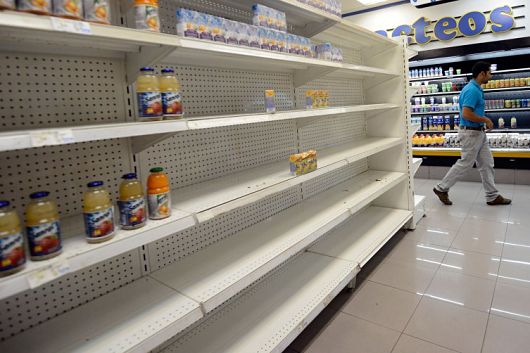Food Shortage In Venezuela: Supermarket Raids

Plagued by collapsing currency and the highest inflation rate in the world, Venezuelans are facing soaring prices and pervasive shortages in their nation. Although waves of food scarcity have troubled the country in the past, this time the food shortage in Venezuela has persisted for over a year and shelves are remaining bereft of many essential products. Citizens are unable to easily acquire food items such as corn flour, rice and coffee, as well as other basic products like detergent and toiletries. Forced to wait in line for hours on end for goods, middle and lower class people in Venezuela are reaching a breaking point.
An unfortunate consequence of this dwindling morale is a countrywide rise in supermarket raids. Videos shared on sites such as Youtube, Whatsapp and Facebook show looters ransacking local supermarkets when rare provisions like coffee and toilet paper hit the shelves.
If Venezuelan citizens wait in line for these products, there is a slim chance that they will be able to get them, making criminal actions extremely tempting. While some looters turn to violence in order to feed their families, others do so with the desire to profit off the crisis by selling the items on the black market.
Many find Venezuela’s predicament somewhat surprising, as it is an oil-exporting country – a characteristic, which usually points to economic prosperity. According to economist Asdrubal Oliveros, however, this oil production is simply not enough.
“Other than oil we produce close to nothing, and even oil production has decreased,” Oliveros said. “There is a lack of hard currency, and, in a country that imports everything, this becomes more evident with food scarcity.”
Native farmer Jesus Lopez agrees with Oliveros. “We used to produce rice and we had excellent coffee; now we produce nothing,” he says. “With the situation here people abandoned the fields.”
Lopez is referring to farmland seized by the Venezuelan government that now sits idle. Oliveros remarks on this government-owned land as well, noting that the seizure caused an overvalued exchange rate that destroyed agriculture because “it’s cheaper to import than it is to produce.”
The government’s potential role in the food shortages may explain why the supermarket raid footage is somewhat controversial. Incidences of supermarket raiding are largely covered up and major national news sources do not address the issue.
Footage of supermarket raids is shared on social media almost weekly, however, and posters maintain that the footage is authentic and emphasize their role as activists. Posting the violent raiding videos on the Internet raises awareness of the issue and allows Venezuelans to gain a perspective on the problem that is not cast in a pro-government light.
Although the violent videos are somewhat shocking, perhaps this shock value is what Venezuela and its citizens need in order to get the country back on track.
– Katie Pickle
Sources: LA Times, The Guardian
Photo: TIME
